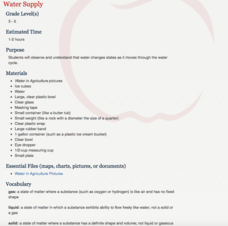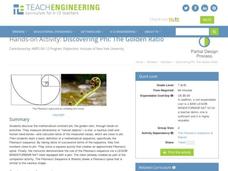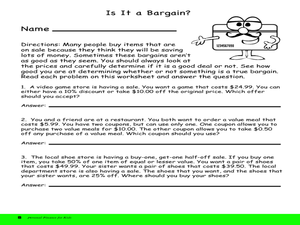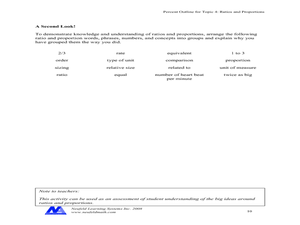Polar Trec
Calorimetry Lab
Young people between the ages of 11–13 need on average about 2,000 calories per day. Within the lab, groups learn about calorimetry and respiration. They explore how it pertains to humans and animals living the Arctic where cold...
National Institute of Food and Agriculture
Water Supply
Participate in three activities that look at the earth's limited water supply and the changes water goes through as it enters each phase of the water cycle. The resource is complete with three activities that demonstrate the changing...
Shodor Education Foundation
Scatter Plot
What is the relationship between two variables? Groups work together to gather data on arm spans and height. Using the interactive, learners plot the bivariate data, labeling the axes and the graph. The resource allows scholars to create...
Kenan Fellows
The Little Stuff Can Make a Big Difference
Great things come in small packages! What better way to illustrate this point than a week-long look at nanotechnology? Earth science scholars explore water quality issues through lab activities, then research new innovations in nanotech...
Equality and Human Rights Commission
Learning area 4: Learn About the Meaning of Community
Scholars examine the jobs found in their community by way of surveying. After collecting data, pupils analyze their findings and share their observations with their peers. A video sparks interest. Two posters motivate participants to...
Curated OER
Polygon Division Models
Students use polygons to explore division. They use pattern blocks to represent whole numbers and fractions. They discuss divisors, factors, dividend and products. In groups, students present models and solve problems. They justify their...
Virginia Department of Education
Balanced
Bring balance to your lesson plans with an activity that asks individuals to solve one-step linear equations with inverse operations. Balance scales help learners understand the concept of isolating the variable.
101 Questions
Angry Bird Quadratics
Launch your classes into a modeling lesson. Young scholars watch angry bird trajectories and make predictions based on their knowledge of quadratic functions. The lesson includes a series of questioning strategies to lead learners to the...
Curated OER
Short-Term and Long-Term Savings Goals
Fifth graders discover how saving money can apply to their lives. In this personal finance lesson, 5th graders use the book The Leaves in October, as a conversation starter on income, savings and setting goals. Students explore the...
Curated OER
Problem Solving: Use Logical Reasoning challenge
In this sorting activity, students use logical reasoning to identify a sorting rule for each set of two pictures and draw a third item that belongs in each group. Students draw four pictures.
Curated OER
Comprehension of Word Problems
Third graders explore math functions by completing a worksheet in class. In this word problem solving lesson, 3rd graders read a book titled Counting on Frank by Rod Clement and utilize the information in the story to answer study...
Curated OER
Subtracting with Regrouping
Second graders explore math functions by completing a worksheet in class. In this subtraction lesson, 2nd graders identify the techniques used to assist in subtracting multi-digit numbers. Students complete a subtraction worksheet and...
Curated OER
The Greedy Triangle - Group Activity
Students explore different shapes and identify them. They make a community map using triangles, rectangles, circles, ovals, squares, pentagons, and hexagons.
The Digits
Telling Time: The Digits
Time to teach your students how to read a clock? This resource is here to help! Engaging young mathematicians with two fun videos and a series of hands-on activities, these lessons offer a multimedia approach to teaching this important...
Teach Engineering
Discovering Phi: The Golden Ratio
Fe, phi, fo, fum. This activity leads pairs to find the ratio of consecutive terms of the Fibonacci sequence. The pairs find that the Fibonacci sequence can be found in many places. A discussion with the class shows that the ratios...
National Security Agency
Line Graphs: Gone Graphing
Practice graphing and interpreting data on line graphs with 36 pages of math activities. With rationale, worksheets, and assessment suggestions, the resource is a great addition to any graphing unit.
Virginia Department of Education
Modeling Multiplication of Fractions
Multiply your understanding of multiplying fractions. A short lesson teaches pupils how to multiply fractions. By using fraction models, they get a better understanding of the concept.
PBS
The Yo-Yo Problem
What do yo-yos and pennies have to do with linear equations? Learn about writing and solving linear equations while considering the Yo-Yo Problem and Penny Pattern Exploration from the High School Math Project. Learners utilize algebra...
EngageNY
Differences Due to Random Assignment Alone
It takes a lot of planning to achieve a random result! Learners compare results of random assignment, and conclude that random assignment allows results to be attributed to chance. They also realize the set of random means...
Curated OER
How Do You Spend Your Money?
Fifth graders examine ways to save and spend money. They look at ways that people earn, save, and spend money using chapters from Tom Birdseye's Tarantula Shoes. They add and subtract decimals to fill in a worksheet entitled, "Is It a...
Neufeld Learning Systems
Concept: Ratios and Proportions
Upper elementary and middle school pupils fill out a chart creating six equivalent fractions and then compare them to six different objects and/or shapes. They group together 16 various terms related to ratios and proportions. Pupils...
Perkins School for the Blind
Circle Time
Oftentimes children or teens with one or more disability are reluctant to participate in whole-group activities. Foster good participation, verbal expression, and social skills through daily circle time activities. Each day you and...
Beacon Learning Center
Ten Pins
Multiplying with multiples of 10, 100, and 1,000 provides an opportunity to discuss patterns that arise with zeros. The class uses these patterns to solve problems. Then they rotate through three work stations, including a computer-based...
Curated OER
Discovering Pi
Define terminology related to a circle. Practice accuracy in measuring and then create a spreadsheet based on data collected from solving for parts of a circle. Groups can have fun analyzing their data as it relates to Pi.

























